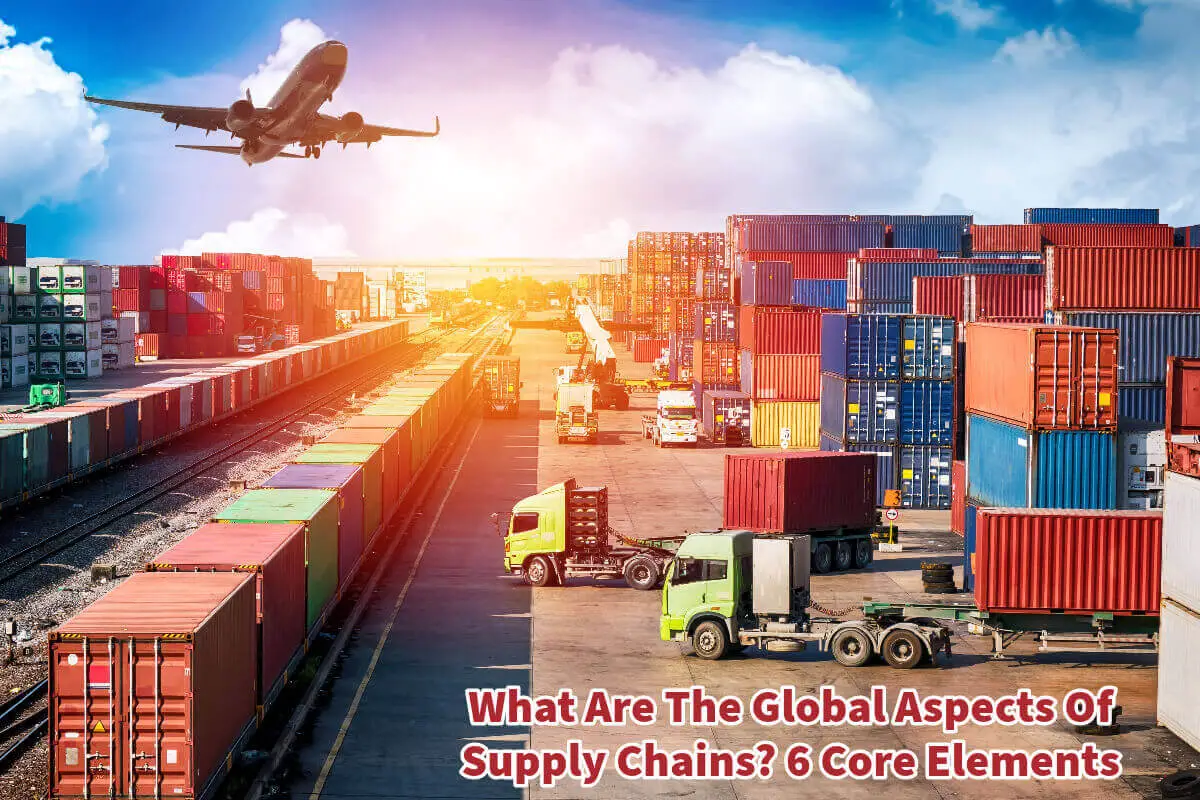As the world grows increasingly interconnected, the boundaries that once defined local commerce are fading. What was once confined within national borders now spans the globe.
It’s no revelation that our supply chain concept has evolved from merely ‘local’ to unmistakably ‘global.’ Trade between nations is at an all-time high, a momentum likely to sustain. Let’s delve deeper into the nuances of this ever-expanding global supply chain.
Table of Contents
What Are The Global Aspects Of Supply Chains?
In today’s interconnected world, the term “supply chain” has expanded beyond regional and national boundaries to become truly global. From sourcing raw materials to delivering the final product to consumers, supply chains now stretch across continents, integrating myriad cultures, economies, and regulatory environments.
Let’s dive into the complexities and multifaceted elements of global supply chains.
Definition Of Global Supply Chain

A global supply chain refers to a network of suppliers, manufacturers, and distributors cooperating to procure, produce, and distribute goods and services to consumers worldwide. This intricate web is not limited to tangible products but also encompasses services and the flow of information.
Transcending national borders, it taps into the global market’s efficiencies and opportunities.
Components Of A Global Supply Chain
- Sourcing: This refers to the procurement of raw materials and components. In a global context, companies source materials from countries where they are abundant or cheap, ensuring cost efficiency.
- Manufacturing: This stage transforms raw materials into finished products. Companies place manufacturing hubs in countries with advantageous factors like low labor costs or skilled workforce.
- Distribution: Once produced, products need to reach the end consumer. This involves warehousing, transportation, and retail, which can be spread across different continents.
- Information Flow: This includes the exchange of data across all levels of the supply chain, from consumer demand forecasts to real-time shipment tracking.
Advantages Of Global Supply Chains
- Cost Efficiency: Sourcing raw materials from low-cost regions and manufacturing in areas with cheap labor can substantially reduce production costs.
- Diversification: By not relying on a single market or source, companies can spread risk, ensuring uninterrupted supply even if one link faces disruptions.
- Access To New Markets: Expanding operations globally exposes businesses to new consumers, increasing their sales potential.
Challenges Of Global Supply Chains
- Complexity: Managing a supply chain spread across numerous countries requires meticulous planning, as disruptions in one part can impact the entire chain.
- Regulatory Issues: Different countries have diverse regulations concerning trade, labor, and environmental standards. Navigating this maze can be daunting.
- Cultural Differences: Varying business practices and cultural norms can lead to misunderstandings, affecting partnerships and negotiations.
- Transportation And Logistics: The longer the supply chain, the more susceptible it is to transportation issues, whether shipping delays or geopolitical tensions.
The Role Of Technology
Advances in technology have been pivotal in making global supply chains feasible and efficient. Tools like the Internet of Things (IoT), Artificial Intelligence (AI), and blockchain allow real-time tracking, data analysis, and enhanced transparency. These technologies help in:
- Predicting Demand: With AI, businesses can more accurately forecast demand, allowing better inventory management.
- Real-time Tracking: IoT devices enable companies to monitor shipments in real-time, anticipating and mitigating potential disruptions.
- Enhanced Communication: Technology ensures seamless communication across the supply chain, making collaborations more effective.
Sustainability And Ethics In Global Supply Chains
The vast reach of global supply chains has raised questions about sustainability and ethics. As operations expand, so does their environmental footprint, leading to increased scrutiny.
- Ethical Procurement: There’s a growing demand to ensure that materials are sourced ethically, without exploitation or environmental degradation.
- Carbon Footprint: With transportation playing a significant role in global supply chains, there’s a focus on reducing emissions by optimizing routes or using sustainable fuels.
- Waste Reduction: Efficient supply chain management can also lead to reduced waste, whether it’s in production or packaging.
Global supply chains are undeniably complex, but they offer unprecedented opportunities for businesses willing to navigate their intricacies.
While challenges like regulatory discrepancies and cultural differences exist, the potential for cost savings, market expansion, and diversified risk make them attractive. Moreover, we can expect even more streamlined and transparent global operations as technology evolves.
As we move further into the 21st century, the focus will likely shift towards creating supply chains that are not only efficient but also sustainable and ethical.
Understanding The Global Supply Chain
The global supply chain is the lifeblood of international commerce, driving the seamless interplay of goods and services worldwide. Let’s delve into its components and significance.

Defining The Global Supply Chain:
A global supply chain is a vast network organizations leverage to produce and distribute goods or services. Unlike local or national supply chains, these networks aren’t confined within a single geographical boundary. Instead, they weave through various countries and even continents.
Key Components Of The Global Supply Chain
At a high level, the global supply chain includes:
- Sourcing: Is the starting point where raw materials or initial products are procured from various global locations.
- Manufacturing Or Production: Raw materials are transformed into finished goods, often in places where production costs are favorable.
- Distribution: Once the goods are produced, they’re distributed across regions to wholesalers, retailers, or directly to consumers.
- Consumption: The end-users, located anywhere in the world, consume the product or service.
- Returns And After-sales: This involves managing product returns, recycling, or providing after-sales services.
- Information Flow: Crucially, the flow of information accompanies the movement of goods. This includes data about product demand, inventory levels, delivery statuses, and more. This information exchange often determines the efficiency of the entire chain.
The Significance Of A Global Perspective
Why opt for a global supply chain instead of a local one? The reasons are multifaceted:
- Cost-efficiency: Organizations can source materials and manufacture products in locations where costs are lower, resulting in competitive prices.
- Market Access: Companies can tap into new and emerging markets, increasing their customer base and revenue potential.
- Risk Diversification: By spreading operations across regions, companies can mitigate risks associated with local disruptions, be it due to natural disasters, political instability, or market saturation.
Challenges And Considerations Of The Global Supply Chain
While global supply chains offer numerous advantages, they’re not without challenges. They’re susceptible to geopolitical tensions, fluctuating currency values, and varied regulatory environments. Plus, with distance comes increased complexity in managing logistics, communications, and quality standards.

A global supply chain is more than just a network; it’s a dance of intricacies that, when executed well, can position a company at the forefront of global commerce. Understanding and effectively managing these supply chains will be paramount for businesses aiming for expansive growth as our world becomes more interconnected.
If you are interested in seeing how Mondoro can help you with your supply chain – we would love to talk to you about how we can help you and be part of your global supply chain.
Find out more about how Mondoro can help you create, develop, and manufacture excellent home decor and home furniture products – don’t hesitate to contact me, Anita. Check out my email by clicking here or become a part of our community and join our newsletter by clicking here.
Mondoro gives out a FREE Lookbook to anyone interested. You can receive a copy of our latest Lookbook by clicking here.
Listen to our Podcast called Global Trade Gal. You can find it on all major podcast platforms. Try out to listen to one of our podcasts by clicking here.
Subscribe to our Mondoro Company Limited YouTube Channel with great videos and information by clicking here.
Related Content
Overcoming 4 Obstacles In Global Supply Chain Coordination
Four significant obstacles need to be addressed: performance indicators, data sharing, pricing obstacles, and operation obstacles. If you understand these obstacles, you can learn how to address each of them and overcome them in your global supply chain. Read on as we explore these obstacles and how to overcome them in your supply chain.
You can learn more by reading Overcoming 4 Obstacles In Global Supply Chain Coordination by clicking here.
How Does Information Sharing Affect Supply Chain Performance?
Information equates to both time and money. Miscommunication or lacking vital information can lead to delays, increased costs, and challenges. Join us as we delve deeper into the indispensable nature of sharing information and effective communication in the supply chain landscape.
By clicking here, you can learn more by reading our blog, How Does Information Sharing Affect Supply Chain Performance?
How AI Technology Is Revolutionizing The Global Supply Chain?
There are many ways that AI will impact the global supply chain. AI’s influence in the supply chain domain is profound, from enhancing operational efficiencies and curtailing costs to elevating customer satisfaction. Read on as we explore the facets of the supply chain that AI will revolutionize and understand their significance.
You can learn more by reading our blog, How AI Technology Is Revolutionizing The Global Supply Chain? by clicking here.


